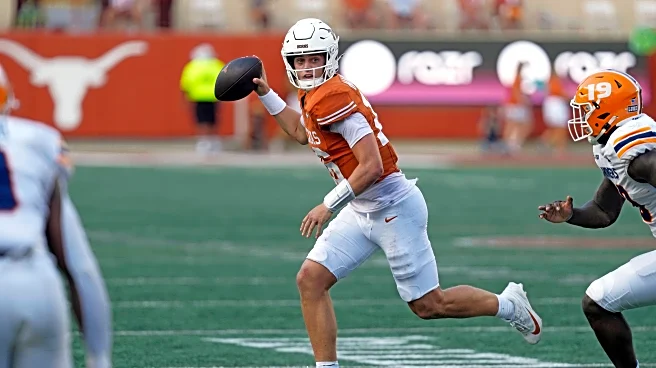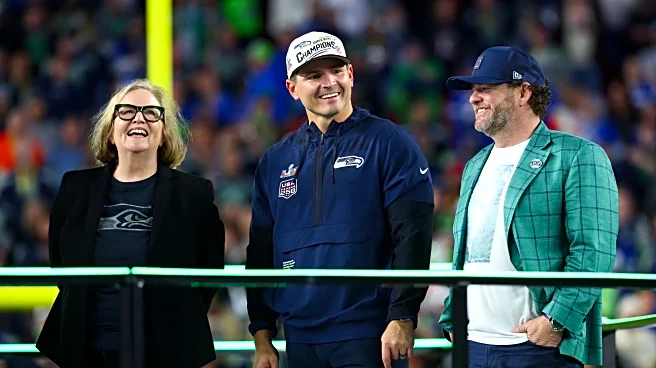“I’m excited. I mean, this is what I’ve been waiting for — I spent two years not playing, so might as well go have some fun, right?”
Three weeks ago, following years of hype, everything was still in front
of Texas Longhorns redshirt sophomore quarterback Arch Manning heading into a high-profile matchup against the Ohio State Buckeyes in Columbus.
“Once it’s time to play, you’ve got to remember there’s only so much film and everything you can watch, it’s time to go rip it,” Manning said.
Despite saying the right things heading into the game and despite all the positives last season in completing 61-of-90 passes for 939 yards, nine touchdowns, and two interceptions, Manning definitely isn’t having much fun and he is decidedly not ripping the football after a poor performances in the loss to Ohio State and Saturday’s 27-1o win over UTEP, including 10 straight incompletions in the first half against the Miners that sent boos cascading down from the fans at Darrell K Royal-Texas Memorial Stadium.
Manning finished the opening 30 minutes 5-of-16 passing for 69 yards (31 percent) and a red-zone interception thrown late and across his body into the end zone.
“I told Arch before the season, you’ve never really been a QB until they boo ya,” Texas head coach Steve Sarkisian said on the TV broadcast. “He got booed in the first half. Now he can start playing.”
The Texas quarterback did steady his performance after halftime, going 6-of-9 passing for 45 yards and a much-needed touchdown pass to sophomore wide receiver Ryan Wingo as Sarkisian aided his quarterback by leaning on the running game, calling 26 runs while featuring Manning’s running ability more prominently against Sarkisian’s philosophical and strategic preferences with the crucible of SEC play looming.
But the struggles for Manning remain hugely concerning as his mental struggles cascade into regular mechanical breakdowns, poor plays linger, and even his athleticism becomes a detriment as his eye discipline deteriorates and he misses open receivers.
The game started to go sideways quickly for Manning — after hitting redshirt freshman running back Christian Clark in stride on a swing pass that went for a 23-yard gain, he climbed the pocket on a 4th and 5 passing play, tried to reset his feet, dropped his arm slot, and bounced another pass intended for Wingo, a consistent theme for Manning through three games.
“The passing game felt like we had some missed opportunities, you know, quite frankly, early in the game that I think really could have changed the complexion of the game. And then I think maybe at that point we started to press after that,” Sarkisian said.
One key moment came early in the second quarter with Texas up 7-0 and facing 4th and 2 in the shot zone. Instead of trying to run the ball or call a more conservative pass play, Sarkisian went for en explosive, calling a play-action post route for redshirt freshman wide receiver Parker Livingstone.
In an example of how Manning’s lack of rhythm is impacting his mechanics, he took several extra hitches instead of hitting the back of his drop, hitching for rhythm, and delivering a throw with confidence. The extra hitches caused Manning’s mechanics to fail, as he leaned too far on the pass, delivering it high and wide of Livingstone, who was open for a potential touchdown.
It was Manning’s first throw after his interception and the third misfire in his 10 consecutive incompletions as his issues compounded.
“I felt like he pressed some tonight. He knew he was missing some throws that I think he’s comfortable making. And then you start skipping reads and scrambling and relying on his legs too much, and that’s always my caution, is that when you have a little success with your legs, then you start to rely on your legs, and then we’re out of scheme, and now we’re just playing athlete football. And athlete football can get you so far, but sooner or later that catches up with you too,” Sarkisian said.
Playing “athlete football” represents a level of regression for Manning, who developed bad habits at times in high school because he played behind an extremely poor offensive line that left him scrambling on almost every drop back.
At Texas, Manning had to learn how to maintain better eye discipline to extend plays to make throws downfield instead of dropping his eyes to the pass rush and relying on his legs to make plays. Now those fundamentals are breaking down.
Manning’s red-zone interception was a perfect example — instead of trusting his initial read and ripping the ball to Livingstone on an out route behind a rub from Wingo to pick up the first down and extend the drive, Manning scrambled all the way across the field and threw a bad interception.
It’s the kind of play that is sticking with Manning too much — at this point in this starting career, his next-play mentality is severely lacking.
“I would probably say for the most part it’s all mental, quite frankly, right? When you really think about the physical ability to make throws, and now it’s trust, belief, confidence, all those things that play into it. His ability to move on to the next play is something that we’ve got to continue to work on, and not harbor the last plays and the last plays and the last plays, and have the ability to refocus, recalibrate, and focus on the next play,” Sarkisian said.
The lack of trust, belief, and confidence is impacting Manning’s mechanics as he presses to make plays.
“I think the one thing that can happen when you can press a little bit is you kind of speed up the delivery, but then slow down the delivery. I know that’s kind of a bit of an oxymoron, but if you think about when you try to speed your arm up and then decelerate your arm,” Sarkisian said.
The Texas head coach compared it to playing bad golf, trying to swing too hard and then slow down at the end of the swing in an attempt to make good contact.
“That’s never a recipe for success, and that’s not a good recipe for throwing a football either, and I felt like that happened at times today,” Sarkisian said.
Manning’s struggles forced Sarkisian to change his gameplan against an opponent he would prefer not to run his quarterback against.
“You have to shift gears as a coach, as a play caller, as a staff and try to lean into the area of the game where you have you’re having some success. Clearly the run game was that and we tried to utilize Arch’s legs a little bit more to get him going,” Sarkisian said.
Manning finished with two rushing touchdowns and 51 rushing yards on nine carries, a highlight of his shaky performance.
Sarkisian did note a handful of positive throws for Manning, including the four-yard touchdown pass to Wingo early in the fourth quarter, the first touchdown connection this year between the redshirt sophomore quarterback and his sophomore wide receiver.
“I loved the touchdown at the end in the fourth quarter, because it was great timing, great route, great throw. Around here, that’s the expectation of the passing game, that that’s how we operate. They understand that, but we’ve got to be able to play at that level consistently, and we’re just not there right now, and it’s our job to try to get him to that point,” Sarkisian said.
The opening script always features plays that Manning feels comfortable with, but they haven’t been effective in producing the rhythm the quarterback back needs to avoid pressing and regressing into playing athlete football.
“He plays better when he’s in more rhythm and rhythmic that way. There were some beautiful rhythm throws — the deep curl route to Parker early in the game, the middle route to Ryan Wingo late, as I said, the out route for the touchdown to Ryan,” Sarkisian said. “Those are nice rhythm throws, and I think that’s when he’s at his best, and that’s our job to find that rhythm in him.”
Manning can play better — he showed that last season — producing a high level of urgency for Sarkisian and his staff to to coax improvement out of their quarterback with only one more game remaining before conference play begins.
“I just know, and I think we all would agree, that there’s better in there, right, that’s to come,” Sarkisan said. “And again, it’s a race to get there as fast as we can.”











